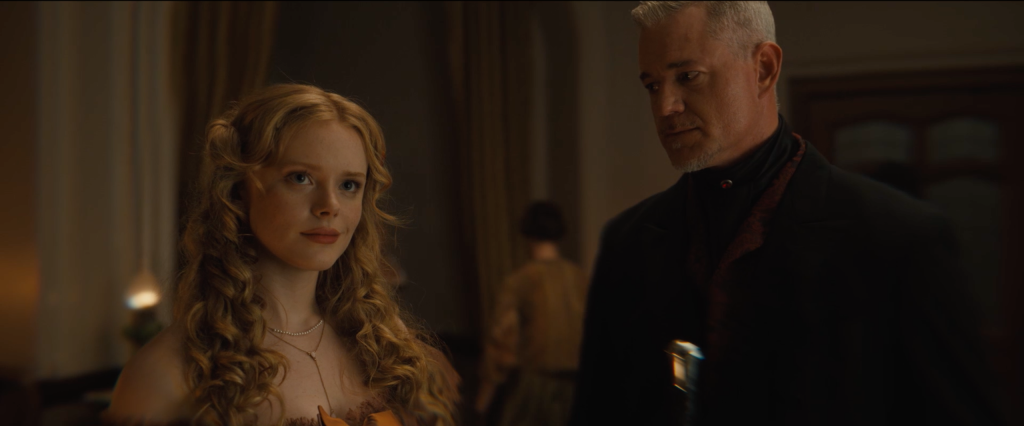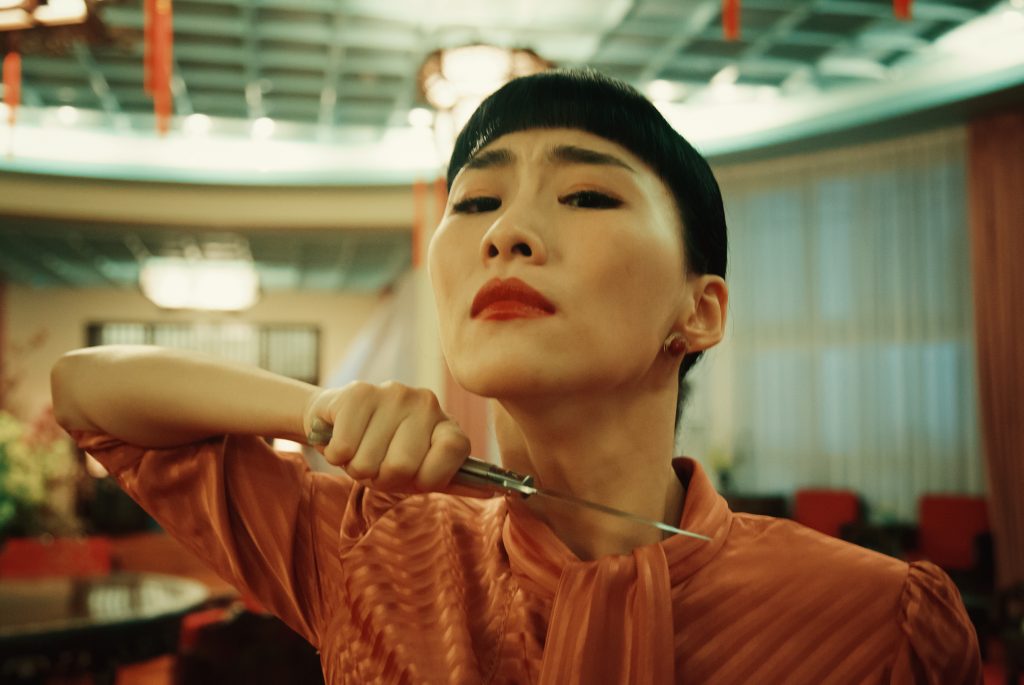February 12, 2022
by Carla Hay

Directed by D.J. Caruso
Culture Representation: Taking place in Boston in 1835, and in San Francisco in the 1850s, the dramatic film “Redeeming Love” features a predominantly white cast (with a few African Americans and Asians) representing the working-class, middle-class and wealthy.
Culture Clash: A woman who was sold into prostitution when she was 8 years old meets a religious man who wants to marry her and turn her into a “righteous woman.”
Culture Audience: “Redeeming Love” will appeal mainly to people who like watching tawdry and sexist movies that preach that “sinful” women need religious men to save them.

“Redeeming Love” is a tacky soap opera masquerading as a faith-based movie. The movie’s sexist and awfully preachy message is that an abused woman can overcome child rape, forced prostitution and incest if a religious man falls in love with her. It’s ironic that a movie that’s supposed to be about redemption has no redeeming qualities in how relentlessly tone-deaf and irresponsible it is in filmmaking and in depicting traumatic issues.
“Redeeming Love” (heinously written and directed by D.J. Caruso) makes all of its female characters exist for the sole purpose of fulfilling men’s fantasies. Even the so-called “love story” at the center of the movie is about a saintly man who wants his fantasy fulfilled of having his prostitute “dream girl” becoming his religious and dutiful wife. It’s obvious that the “Redeeming Love” filmmakers don’t want viewers to expect any other outcome.
Caruso adapted the “Redeeming Love” screenplay from Francine Rivers’ 1991 novel of the same name. Filmmakers who turn a book into a movie have the freedom to set the tone of the movie and make cinematic changes that are different from the book. The filmmakers of “Redeeming Love” (with Caruso at the helm) chose to make the female protagonist a mostly pathetic lost soul whose life can only be turned around if she just lets a religious man love her.
The “woman who needs saving” is named Angel (played by Abigail Cowen), who is the most popular prostitute at a San Francisco brothel called Pair-A-Dice. (“Redeeming Love” was actually filmed in South Africa.) The movie, which takes place over several years, opens in 1850 with a scene at Pair-A-Dice, where about 50 dirty and disheveled Gold Rush miners have gathered outside near the front porch for a lottery. It’s not an ordinary lottery. The winner whose number is chosen will get guaranteed time the next day with 23-year-old Angel, who is so in-demand, she doesn’t have time to “service” all the men who want to hire her.
The Pair-A-Dice’s cruel and greedy manager/madam, who only goes by the name Duchess (played by Famke Janssen), proudly oversees this lottery because she knows that Angel is the sex worker who makes the most money for the brothel. At different times in the movie, Duchess is seen physically abusing her young female employees, or ordering her henchmen to inflict abuse if she thinks these sex workers are being insubordinate. Duchess won’t pass up the chance to make money any way that she can from the brothel’s demanding customers.
Duchess makes this announcement to the crowd of men who have eagerly gathered to see Angel: “She’s done shagging for the day. She’s all worn out. I have plenty of other girls—Chinese, African, Spanish—dealer’s choice. But if you want Angel, you’ll have to come back tomorrow. And by guess or by gully, it’ll be your lucky day!” Get used to this type of cringeworthy dialogue in “Redeeming Love,” which is a cesspool of idiotic filmmaking.
Angel is not a “hooker with a heart of gold,” because she’s supposed to be “redeemed,” remember? Instead, Angel is very bitter and angry about her life. She can’t picture herself as anything but a jaded prostitute.
An early scene in the movie shows Angel and some of her co-workers talking about their unhappy and abusive childhoods. An Irish woman named Lucky (played by Jamie-Lee O’Donnell) goes into details about being beaten as a child. Mai Ling (played by Ke-Xi Wu), who is originally from China, says that her father sold her into prostitution.
Flashbacks to Angel’s childhood reveal how she ended up as a sex worker for most of her life so far. Angel’s birth name is Sarah Stafford. The movie flashes back to 1835, when Sarah (played by Livi Birch) was an 8-year-old living in Boston with her single mother Mae (played by Nina Dobrev), who is an outcast in this society because she is an unmarried woman with an illegitimate child.
Sarah’s biological father is wealthy Alex Stafford (played by Josh Taylor), who is married to another woman. It’s implied that Sarah was born from an extramarital affair. Alex doesn’t want to publicly claim Sarah as his child, but he has been sending money and gifts to Mae. He wants Mae, not Sarah, to have the money and gifts.
One day, something happens that has never happened before: Sarah meets Alex for the first time, when he comes over to visit Mae. Mae introduces Sarah and Alex to each other, with a look of hope and apprehension. At first, the meeting is cordial but awkward.
But the meeting turns sour when Alex finds out that Mae took the money he had sent and spent it on Sarah, who also got the gifts that were originally intended for Mae. Alex becomes enraged and begins physically assaulting Mae and verbally degrading her. Sarah witnesses this abuse, including when Alex shouts at Mae that he never wanted Sarah to be born and that Mae should have terminated the pregnancy.
Another flashback reveals that Mae eventually died of an unnamed illness when Sarah was 8. Sarah, who is now considered to be an orphan, ends up in the custody of a sleazy man named John Altman (played by Willie Watson), who tries to get a woman named Sally (played by Tanya van Graan) to agree to take care of Sarah, but Sally refuses. John then tries to sell Sarah to a ruthless Irish criminal named Duke (played by Eric Dane, doing a terrible Irish accent), who runs a brothel where girls are held as sex slaves.
Duke doesn’t just kidnap Sarah. He also orders his henchman Colin to murder John as soon as John brings an innocent Sarah to Duke. One of the first things that Duke says to Sarah after she becomes his captive is that she’s now going to be his “wife.” Disgusting. This is the scene where viewers find out that Duke is a pedophile. Another scene reveals that Duke rapes the girls who are held in his captivity and who are prostituted out to other men.
The movie eventually reveals that Sarah ended up in San Francisco because she ran away from Duke. But is it the last time she sees Duke? Of course not, because he never stopped looking for her, and this movie is filled with sordid melodrama. Duke eventually ends up in San Francisco in the 1850s. He still keeps underage girls as sex slaves. And you can predict the rest, including what happens to Duke.
It might come as a surprise that for all of its disturbing subject matter, “Redeeming Love” is actually not a movie with a rating that recommends a minimum age of 17 for appropriate viewing. It’s actually been rated as appropriate for kids who are at least 13 years old. That’s because there’s no nudity in the movie. And the movie’s sex scenes are very tame.
Still, any parents who decide to let their underage kids watch “Redeeming Love” should know that this is not a wholesome movie at all. There’s a scene where an adult Sarah/Angel ends up having her father Alex as a sex customer. He doesn’t know that she’s his daughter, but she knows exactly who she is. He only knows her as Angel, and he tells her that she looks familiar.
However, Angel/Sarah still doesn’t reveal to him that she’s his abandoned daughter, and she deliberately has sex with him. (This incestuous sex is not shown in the movie, but it is openly discussed.) After Alex finds out the horrible truth, he commits suicide. Based on Sarah’s reaction (she seems happy that her father committed suicide), it’s implied that Angel/Sarah knowingly committed this act of incest for revenge and with the hope that it would lead to her father killing himself.
The incest in this movie might be considered spoiler information for people who don’t want to know about any surprises in the movie’s plot. However, it’s important for viewers to know in advance how this so-called “faith-based” movie has some morally twisted subject matter whose only purpose is to make Angel/Sarah look as trashy as possible. It’s one thing to be a victim of child abuse, which is not the victim’s fault. It’s another thing to be an adult and try to get a parent to commit suicide by knowingly having sex with the parent. It’s absolutely reprehensible.
But if Angel weren’t so “morally bankrupt,” then it wouldn’t make her “male rescuer” look as noble. Michael Hosea (played by Tom Lewis) is a 26-year-old farmer who is first seen in the movie when he’s praying alone in a church and asking God to find him a romantic partner/future wife. “Maybe she likes fishing,” Michael says out loud as he prays. “Maybe she has long legs. You know the kind I need. I trust you,” Michael adds, as if God is in the mail-order bride business.
When Michael first sees Angel in a horse-drawn carriage on the street, it’s “love at first sight” for him. He tells a friend who’s with him that he just saw the woman he’s going to marry. When the friend tells Michael that Angel works at the Pair-A-Dice brothel, Michael is undeterred. It’s at that moment that Michael decides he’s going to “save” Angel.
The movie makes a big deal out of reminding viewers that Michael is a humble and poor farmer. But somehow, Michael has enough money to visit Angel several times, in an effort to court her and get her to marry him. He refuses to have sex with her during these visits, even though Angel offers sex to him as part of the transaction. Michael tells Angel that he doesn’t want to have sex with her until she falls in love with him.
The rest of “Redeeming Love” is a horrendous slog of the ups and downs of Michael and Angel’s relationship. There’s a time-wasting subplot involving Michael’s widower brother-in-law Paul Atherton (played by Logan Marshall-Green), who was married to Michael’s sister Tess, who died in 1847, when she was 21. Paul doesn’t approve of Angel being in Michael’s life. Guess who used to be a customer of Angel’s before Michael met her?
There’s also some tedious drama about fertility that comes to the forefront when a family called the Altmans end up visiting Michael’s farm. This clan includes John Altman (played by Willie Watson), his pregnant wife Elizabeth (played by Lauren McGregor), and their two daughters: Miriam (played by Tayah Ronen Abels), who’s about 14 or 15, and Ruthie (played by Tayah Ronen Abels), who’s about 10 or 11.
The performances in “Redeeming Love” are tonally off-kilter. Some of the cast members ham it up too much with their acting, while others seem bored. Cowen and Lewis (who makes his feature-film debut in “Redeeming Love”) have zero chemistry together as Angel and Michael. Angel is depicted as a fickle and flaky heartbreaker, while Michael is “too good to be true.” The filmmakers clearly want Michael to get most of the sympathy from viewers, even though Angel is the one who’s had the much harder life of being abused and exploited.
Everything about this movie is extremely condescending to women, to the point where it comes across as misogynistic. The female characters with the biggest speaking roles and the most screen time in “Redeeming Love” are involved in prostitution, when there should be a wider variety of women in the movie. That’s an example of Caruso’s sexist writing and directing for this film. “Redeeming Love” is trying to pretend that it’s an epic love story, but it’s really just epic trash.
Universal Pictures released “Redeeming Love” in U.S. cinemas on January 21, 2022. The movie is set to premiere on Peacock on March 7, 2022.


